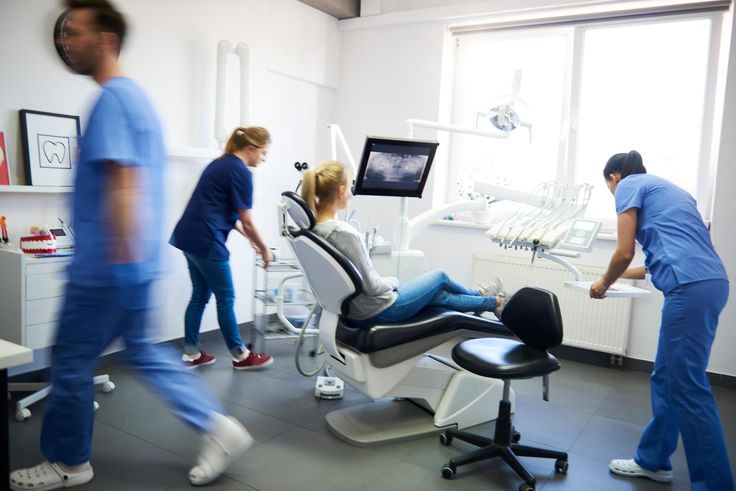Dental practices across the UK are grappling with significant workforce challenges that affect both NHS and private dentistry. Ongoing staffing shortages have made it increasingly difficult for dental teams to provide consistent, high-quality care. This issue is particularly acute in rural and coastal regions, where uneven distribution of dental professionals limits access to care.
For practice owners, strengthening recruitment and improving retention are now strategic imperatives to safeguard oral healthcare services and ensure continuity of patient care.
This blog provides practical recruitment and retention strategies to help UK dental practice owners address workforce shortages and maintain quality dental care.
Recent reports from NHS England highlight significant challenges in filling NHS dental vacancies, with many positions remaining unoccupied for extended periods. A qualitative study published in BMC Health Services Research identifies burnout, limited clinical autonomy, and declining job satisfaction as key factors prompting numerous dental practitioners, especially within the NHS, to reconsider their careers.
Several factors contribute to the current state of dentistry in the UK:
The British Dental Association (BDA) has repeatedly stressed the need for systemic reform to protect NHS dentistry and ensure continued access to dental care services.
Workforce shortages result in reduced dental activity, cancelled appointments, and increased waiting times for patients. Practice owners often struggle to recruit and retain reliable dental professionals, which puts additional pressure on existing teams. The strain can compromise the quality of care and increase burnout rates among staff, further exacerbating retention problems.
For dental practices, this means a challenging environment where the ability to deliver comprehensive dental care is compromised. Dentists and dental nurses report significant stress linked to workload, lack of professional development opportunities, and limited work-life balance, particularly in NHS dental services.
To address these workforce shortages and the recruitment and retention crisis, dental practices must adopt practical and research-backed approaches:
A lengthy or cumbersome recruitment process risks losing talented candidates. Partnering with a trusted agency like Verovian Dental Recruitment Agency,which specialises in placing dental professionals across the UK, streamlines hiring and saves time. Virtual interviews widen access, while clear job adverts that reflect your practice’s values, culture, and commitment to care attract the right candidates.
Given local shortages, recruiting from overseas is increasingly common. The General Dental Council (GDC) provides pathways for overseas dentists and dental care professionals to join the UK workforce, including those from countries with mutual recognition agreements. Additionally, recruiting newly qualified dental students and providing structured mentorship can help bridge gaps while supporting workforce development.
A positive, supportive work environment plays a crucial role in retaining dental staff. Practices should promote teamwork, inclusivity, and open communication. Addressing burnout through realistic scheduling and support mechanisms helps improve job satisfaction. Celebrating achievements within the dental team fosters a sense of belonging and motivation.
Opportunities for career progression and skill development are vital to retaining dental care professionals. Practices can offer continuing professional development (CPD) for dental nurses, hygienists, therapists, and dentists. Mentorship programmes for new dental practitioners support smoother transitions into clinical roles. These initiatives not only enhance clinical dental skills but also boost morale and retention.
The COVID-19 pandemic has reshaped priorities, with many dental professionals valuing work-life balance more highly. Practices can offer part-time roles, job shares, term-time contracts, or remote work options for administrative duties. Flexibility helps retain experienced staff who might otherwise leave due to rigid scheduling or retirement plans.
In a competitive recruitment market, showcasing your practice’s commitment to reducing oral health inequalities and advancing dental care can attract candidates who share these values. Highlighting connections with Health Education England, dental charities, or community programmes reinforces your practice’s role in improving oral health access, especially in underserved rural and coastal areas.

Retention begins with understanding and responding to staff needs. Dental professionals often cite limited autonomy, poor work-life balance, and excessive stress as reasons for leaving. Practice owners can improve retention by:
National reforms such as NHS contract changes and the Advancing Dental Care Review are underway, but local action remains essential. Staying updated on regulatory changes ensures alignment with broader strategies, but individual practices must also take responsibility for workforce sustainability.
Addressing recruitment and retention challenges at the practice level helps preserve NHS dental care and supports primary care networks, particularly in areas most affected by shortages.
The UK’s dental staffing crisis demands urgent, practical responses from practice owners. From increased attrition to regional disparities in workforce distribution, the challenge continues to disrupt care delivery and widen oral health inequalities.
By improving work environments, offering flexible roles, and committing to staff development, practice owners can build resilient dental teams. These measures not only enhance job satisfaction but also improve patient outcomes and reinforce the overall stability of dental care delivery.
Adopting a proactive recruitment and retention approach will help ensure long-term success for dental practices across the UK.
Verovian Dental Recruitment Agency connects UK practices with skilled local and international dental professionals. We provide end-to-end recruitment, access to global candidates and workforce planning advice, helping you overcome staffing challenges and build a stronger dental team. Get in touch with us today to find the right talent and keep your practice thriving.
Informed consent is far more than a signature on a form—it’s the cornerstone of ethical, legal, and professional dental practice in the UK. Whether you're a newly qualified dentist or an experienced clinician, ensuring that every patient understands their treatment options, associated risks, and possible outcomes is not only essential for patient care but also critical in protecting your professional reputation and your practice.
In this blog, we explore what informed consent means within UK dentistry, why it matters, and best practices to help you stay compliant, confident, and in control.
Informed consent is the process by which a patient voluntarily agrees to a proposed dental treatment after being fully informed of its nature, risks, benefits, and alternatives. It reflects the trust and collaboration between clinician and patient.
Dentists must ensure that patients not only receive the necessary information but also genuinely understand it and make decisions free from pressure. Consent may be verbal, written, or implied, but clarity and proper documentation are essential.
The 2015 Montgomery v. Lanarkshire Health Board case changed the landscape of medical and dental consent in the UK. It established that practitioners have a duty to inform patients of any material risks involved in a proposed treatment, as well as reasonable alternatives. It’s no longer about what the “reasonable dentist” would disclose—it’s about what the individual patient needs to know.
Informed consent champions a patient's fundamental right to choose what happens to their body. It empowers individuals to make informed decisions about their dental care, moving from a dentist-led approach to a collaborative one where patient values guide treatment.
This isn't just an ethical ideal; it's a legal must in the UK. Dental professionals must secure valid consent before treatment or face legal risks like assault or negligence claims. Regulatory bodies like the General Dental Council (GDC), through their Standards for the Dental Team, and the Care Quality Commission (CQC), via Regulation 11 of the Health and Social Care Act, explicitly mandate obtaining proper consent. Detailed documentation of the consent process, therefore, is crucial legal evidence to demonstrate compliance with these standards and protect against potential disputes.
Beyond legalities, informed consent builds trust. It promotes transparency and honesty, ensuring that treatment aligns with a patient's understanding and personal values. This ethical duty balances the dentist's role in providing care with the patient's right to decide.
When patients understand their diagnosis, treatment options, risks, and benefits, they make better choices. This clarity reduces anxiety and often leads to greater compliance with aftercare, resulting in better long-term oral health and a more positive experience.
Adhering to informed consent principles is central to professional standards set by bodies like the GDC. It's a continuous process, not a one-off event, ensuring patient involvement at every stage of their dental journey and demonstrating good practice.

Dentists must explain diagnoses, procedures, risks, benefits, and alternatives using plain, jargon-free language. It’s vital to check the patient’s understanding—don’t just speak to them, engage with them.
Patients must feel free to make their own decisions without coercion. This includes the right to refuse treatment or to change their mind at any point, even after giving initial consent.
You must ensure your patient has the mental capacity to make informed decisions, as outlined in the Mental Capacity Act 2005. For children and vulnerable adults, additional legal frameworks apply, and consent must be obtained from a parent, guardian, or legal representative when appropriate.
While verbal consent may suffice for routine treatments, written consent is crucial for invasive, complex, or high-risk procedures. Always document what was discussed and agreed upon in the patient’s clinical notes.
Not all patients process information in the same way. Be mindful of language barriers, literacy levels, and disabilities. Use interpreters, diagrams, or digital tools where necessary to support understanding.
A well-documented consent process protects you in the event of a complaint or legal challenge. Records should include:

In a busy practice, it can be tempting to gloss over the consent process. However, skipping steps can lead to misunderstandings, complaints, or even litigation. Take the time to ensure each patient is fully informed.
Just because a patient nods or signs a form doesn’t mean they truly understand. Encourage questions and offer opportunities to reflect or come back with concerns.
Failing to document conversations around consent is a common yet costly oversight. Your notes are often your only defence if a claim arises.
Informed consent is not the sole responsibility of the dentist—it’s a team effort. From dental nurses to treatment coordinators and receptionists, each team member contributes to creating an environment where patients feel respected, well-informed, and empowered to make decisions.
Consistency in communication across your team reinforces trust and minimises the risk of misunderstandings. Holding regular training sessions and role-specific refreshers ensures that everyone understands their part in the consent process and is equipped to support it confidently and competently.
Informed consent isn’t a tick-box exercise—it’s a legal and ethical obligation that also builds trust and enhances the patient experience. By adopting clear, patient-focused communication and meticulous record-keeping, you protect not only your patients but your practice and your professional future.
At Verovian Dental Recruitment, we work with dental practices that prioritise compliance, professionalism, and patient care. Whether you're a dentist seeking a new opportunity or a practice in search of quality talent, we can help. Register with us today to learn more about roles that value ethical excellence and best practices.
The 2025 NHS dental contract reform marks one of the most significant changes to NHS dentistry in nearly two decades. It aims to improve access to NHS dental care, update the outdated funding model, and empower the entire dental workforce. These reforms will have a lasting impact on dental professionals across England, addressing critical challenges within the NHS dental profession.
This blog highlights the key updates in the 2025 NHS dentistry contract, explains why reforming NHS dentistry was necessary, and provides practical guidance for dental teams to adapt successfully to the evolving future for NHS dentistry.
One of the most significant updates in the NHS dental contract is the adjustment of UDA values to more accurately reflect the complexity and time involved in dental procedures. Treatments such as molar extractions, root canal therapy, and periodontal care now attract higher UDA values. This change ensures that dentists receive fairer compensation for delivering complex dental care under NHS dental services.
To improve access to NHS dentistry, especially in rural and underserved areas, the reform introduces a financial incentive for practices accepting new NHS patients. The New Patient Premium is designed to encourage practices to increase patient intake, helping to reduce waiting times and improve the patient experience.
Dental hygienists, therapists, and dental nurses will now be able to deliver a broader range of treatments independently, without direct supervision by dentists. This shift enables the entire dental team to work at the top of their license, improving efficiency within dental practices and allowing dentists to focus on more advanced procedures.
In line with the plan to recover and reform NHS dentistry, practices are incentivised to offer more NHS appointments. This move aims to tackle the longstanding issue of limited access, particularly in high-demand or underfunded regions.
A significant focus of the 2025 NHS dentistry contract is the shift towards preventive care. Education, early intervention, and oral health promotion will now receive better compensation. This change aligns with the broader public health goal of preventing dental disease rather than merely treating it.
The 2025 reform of NHS dentistry is now in effect, representing a crucial step to recover and reform NHS dental services across England. The previous NHS dental contract, based on Units of Dental Activity (UDA), often failed to fairly compensate dental professionals for complex treatments, contributing to workforce challenges and low morale within the NHS dental profession. Many patients continue to struggle to see an NHS dentist due to limited access to NHS dental care, especially in underserved areas. This dental recovery plan, led by NHS England and the Department of Health and Social Care (DHSC), addresses these issues by improving access to NHS dentistry, supporting the entire dental workforce, and incentivising preventive care. The reform is designed to fix NHS dentistry’s broken funding model, enhance workforce sustainability, and secure the future for NHS dentistry by creating a more equitable, efficient, and patient-focused dental service.

The 2025 NHS dentistry reforms will have a significant impact on dental professionals across England, introducing key structural and clinical changes. Practices will face increased accountability, requiring more detailed reporting on patient outcomes to NHS England and Integrated Care Boards (ICBS). The roles of dental hygienists and therapists have been expanded, necessitating adjustments in team structures and workflows. Additionally, all dental staff must undergo training to upskill in both clinical practice and administrative reporting. With a renewed emphasis on preventive care, more time will be devoted to patient education, early intervention, and outreach, shifting the focus from reactive to proactive oral health.
While the reforms offer many benefits, there are also challenges for dental professionals:
To navigate the 2025 contract changes effectively, dental professionals should:
By taking these steps, professionals can meet contractual expectations, enhance patient care, and support the long-term goals of NHS dentistry.
The 2025 NHS dental contract represents a major milestone in the evolution of NHS dentistry. With a stronger emphasis on oral health, access, and workforce flexibility, the reform provides both challenges and opportunities for dental professionals. Those who adapt proactively will be better positioned to deliver high-quality care and ensure the long-term sustainability of NHS dental services.
The ultimate goal is clear: to make NHS dentistry more accessible, equitable, and focused on long-term patient care.
Join Verovian Dental Recruitment Agency today! We connect qualified dental professionals with top NHS and private practices. Apply now!
If you're considering a career in the field of dental care professionals (DCPS) in the UK, you might be weighing the roles of a dental hygienist or dental therapist. These NHS-recognised positions are essential to both public and private dental services. While their responsibilities often overlap, understanding the difference between a dental therapist and a dental hygienist is vital for choosing the right path.
Dental hygienists and dental therapists are registered members of the dental team regulated by the General Dental Council (GDC). Both play preventive roles and support dentists in providing quality care.
Dental hygienists focus on preventive oral care. Their duties include:
They can work under supervision or independently through Direct Access.
Dental therapists offer both hygiene services and a wider range of restorative dental procedures, such as:
They are especially active in NHS community settings, helping to reduce waiting lists and expand access to care.
While both dental therapists and dental hygienists play essential roles in UK dental care, their training, responsibilities, and focus on patients differ.
Though distinct in scope, both dental hygienists and dental therapists share several key responsibilities and professional standards within UK dental practice.
Both are registered and regulated by the General Dental Council (GDC), ensuring they meet national standards and engage in ongoing professional development.
Each role prioritises oral health promotion, patient education, and preventative care, such as advising on oral hygiene, gum disease prevention, and daily tooth brushing habits.
Thanks to Direct Access, both can see patients without a dentist’s referral in certain settings, improving access to routine dental care.
They work across NHS, private, and community dental clinics, supporting general dentistry and public oral health.
Taking on preventative and routine dental procedures both helps ease dentists' workloads, reduce waiting times, and expand patient access to timely treatment.

Dental Hygienists and Therapists are essential members of the wider dental team, including dentists, nurses, and specialists. Their collaborative work ensures:
For instance, a patient might see a hygienist regularly for gum health and oral hygiene education, while being referred to a therapist for fillings or paediatric care each role complements the other.
Your choice between dental hygiene and dental therapy should depend on your career interests:
The outlook is strong for dental hygienists and dental therapists in the UK. Increasing demand for preventative care, restorative treatments, and direct access services ensures continued growth across NHS and private practices.
Dental Therapists and Dental Hygienists are essential to the UK’s dental workforce. Although they share some responsibilities, their training and clinical duties make each role distinct. Whether you're interested in preventative care or restorative procedures, a fulfilling career in dental care awaits. Explore both paths to find the one that aligns with your passion for improving community oral health.
Whether you're looking to practice dental care as a hygienist or therapist, Verovian Dental Recruitment Agency can connect you with flexible roles, supportive teams, and rewarding opportunities across the UK.
Continuing Professional Development (CPD) is a vital aspect of maintaining safe, effective, and up-to-date dental care. Overseen by the General Dental Council (GDC), the CPD requirements ensure that dental professionals across the UK are continually learning and improving their skills throughout their careers.
Recently, the GDC has announced updates to its CPD process, with the goal of making it more reflective, meaningful, and aligned with professional practice. Whether you're a dentist, dental nurse, hygienist, or technician, these changes affect you. In this blog, we’ll break down what’s new, what remains unchanged, and how to stay on track.
The recent changes aim to simplify the process of recording and submitting CPD, making it more straightforward for dental professionals to meet their obligations. They also help CPD providers issue valid certificates more efficiently. These updates respond to feedback from stakeholders who highlighted the practical difficulties many professionals face when documenting their learning.
By easing some of the administrative burden, the GDC hopes to allow dental professionals to concentrate on what truly matters—their ongoing professional development and the delivery of safe, effective patient care.
The GDC has introduced several updates to simplify how you record, verify, and submit your CPD. These changes are designed to reduce administrative burdens and help you meet your professional development requirements with greater ease. Here’s an overview of the key updates:
Registration numbers are no longer mandatory on CPD certificates. While you can still add it if you wish, it is no longer a requirement. The revised guidance now clearly reflects this update for both dental professionals and CPD providers.
Signatures on CPD certificates are no longer necessary to confirm the accuracy of the information. Instead, providers are encouraged to use statements such as:
"We confirm that the information provided on this certificate is full and accurate and that this CPD has been subject to quality assurance."
This confirmation can also be sent via email, with either a printed name or a signature. The sample CPD certificate has been updated to reflect this change.
Mapping documents no longer require a signature. A simple email from the CPD provider confirming that the relevant criteria have been met will suffice. If you are unable to complete a mapping document in full, you can submit alternative evidence, such as an email from the provider confirming that the CPD criteria have been met.
You are required to complete your CPD activities before the end of each five-year cycle. However, if you are unable to meet the requirements and have a valid reason, you can apply for a grace period, which can give you an additional 56 days. You must request a grace period via your eGDC or by email within the last six months of your CPD cycle. Please note that CPD hours completed outside of the relevant cycle will not be accepted unless a grace period has been agreed upon.


While the GDC has introduced some important improvements, the core structure of the Enhanced CPD scheme remains unchanged:
Minimum CPD Hours
You must still complete at least 10 hours of CPD in every two-year period and meet the minimum required hours over your five-year cycle (e.g., 100 hours for dentists and 75 for dental care professionals).
Annual CPD Declaration
You will continue to declare your CPD hours annually at the time of your registration renewal.
Personal Development Plan (PDP)
Your PDP remains a key tool for planning your learning and demonstrating its relevance to your scope of practice.
To properly record your CPD, you must maintain a personal development plan, link your activities to at least one development outcome, and keep either a certificate, a mapping document, or an email from the provider as evidence of verifiable CPD.
For more details, see the GDC Scheme for CPD.
To stay compliant with the updated CPD processes:
The GDC’s update to CPD processes is a positive step towards more meaningful, reflective learning across the dental profession. By aligning CPD with your real-world responsibilities and patient care goals, the GDC hopes to ensure dental professionals are supported in their development—now and into the future. Be sure to review your current CPD plans, explore the new tools available, and embrace this opportunity to shape your growth as a dental professional.
Staying on top of your CPD is just one part of building a successful dental career—partnering with the right agency is another. At Verovian Dental Agency, we’re committed to helping you thrive, whether you’re searching for locum roles, permanent placements, or career advice tailored to your goals. Let us connect you with opportunities that align with your expertise and ambitions. Register with us today and take the next step towards a fulfilling dental career.
Dentistry is a highly rewarding profession, but it comes with its fair share of challenges. Long hours, demanding patient expectations, and the pressure to provide high-quality care can contribute to stress and burnout. According to the British Dental Association (BDA), in a recent survey, stress levels among dentists are significantly higher than in many other professions, with mental health concerns becoming increasingly prevalent.
So, how can dentists manage stress while maintaining a successful career? Whether you're an associate, a locum, or running your practice, finding the right work-life balance is crucial. Here are some practical strategies to help you reduce stress and enjoy a more fulfilling career.
Before tackling stress, it’s crucial to recognise what’s causing it. For many dentists, heavy workloads, tight schedules, and financial pressures can quickly become overwhelming. The emotional toll of dealing with anxious or difficult patients can result in additional stress, while the never-ending cycle of regulatory paperwork can make the job feel more draining. On top of this, a lack of career satisfaction or poor work-life balance can leave many professionals feeling stuck and exhausted.
By identifying which factors contribute most to your stress, you can take proactive steps to manage them effectively.


Your work environment plays a crucial role in stress levels. Some settings may be more demanding than others, and finding a role that suits your career aspirations and lifestyle is key.
Managing time effectively can make a world of difference in reducing daily stress. One of the best ways to stay organised is by streamlining appointment scheduling. Tools like digital booking systems can help maintain a smooth patient flow, preventing last-minute rushes. Delegation is also essential for managing your workload. Delegate tasks when necessary to free up valuable time, allowing you to focus more on patient care and other key responsibilities.
Additionally, setting realistic goals is key to avoiding burnout. Overcommitting may seem productive, but consistently seeing too many patients in a day can quickly lead to exhaustion. By managing your workload wisely and prioritising efficiency, you can create a healthier, more balanced work routine.
Your well-being should be just as important as your patients'. Maintaining a healthy lifestyle can help combat stress:
A strong support system can make a significant difference in managing stress and maintaining well-being as a dentist.


Achieving a healthy work-life balance also involves setting clear boundaries between work and personal time. Taking regular, short breaks during the day, even between appointments, can give you the energy boost you need to stay focused and refreshed. When the workday ends, disconnecting from emails and messages is crucial for recharging and fully enjoying your personal time. Don’t forget to plan regular holidays and time off—these breaks not only prevent burnout but also allow you to return to work feeling rejuvenated and ready to tackle new challenges.
Stress is a reality for many dentists, but with the right strategies and career choices, it can be managed effectively. By prioritising time management, self-care, and supportive networks, you can maintain a healthy work-life balance while excelling in your profession.
Finding a job that aligns with your career goals and personal life is crucial. At Verovian Dental Agency, we match you with roles that fit your preferred working hours and lifestyle, offering career progression opportunities without compromising your well-being. We also provide flexible locum positions for those seeking more control over their schedule. If you're looking to improve your work-life balance, our team is here to help. Explore our latest opportunities today and take the first step towards a stress-free, fulfilling career!
IR35 rules, set by Her Majesty's Revenue and Customs (HMRC), are crucial for locum dental professionals—dentists, hygienists, and dental nurses alike. These rules determine how self-employed workers, particularly those operating through intermediaries like Personal Service Companies (PSCs), are taxed. For locums, understanding IR35 is essential for accurately calculating your tax liabilities, maintaining compliance, and avoiding potentially significant penalties.
Whether you're new to the world of locum work or a seasoned pro seeking clarity on the latest regulations, this guide will break down everything you need to know about IR35 and its impact on dental locums. We'll provide actionable advice to help you stay compliant in 2025 and beyond.
Introduced by HMRC, IR35 is a tax legislation designed to prevent ‘disguised employment’—where a contractor works as a self-employed individual but functions similarly to an employee. The key distinction IR35 makes is whether a contractor is truly independent or should be classified as an employee for tax purposes.
For locum dental professionals, IR35 applies when you work via a limited company (Personal Service Company—PSC) or through an agency. If deemed ‘inside IR35,’ you are considered an employee for tax purposes and will be subject to PAYE tax and National Insurance (NI) deductions, potentially reducing your take-home pay.
Locum dentists often work in different contractual setups, and IR35 status can vary depending on your working arrangements. Here’s how it may impact you:
HMRC considers three main tests when assessing IR35 status:



To check your status, you can use HMRC’s Check Employment Status for Tax (CEST) tool. However, this tool has been criticised for its lack of accuracy, so seeking professional advice from an accountant or tax specialist is advisable. Misclassification can lead to penalties, so it’s essential to assess your contracts carefully.
Navigating IR35 can be complex, but with the right approach, you can remain compliant while maximising your earnings:
Failing to comply with IR35 regulations can lead to significant penalties, including backdated tax payments and fines. It’s essential to ensure that your contracts and working arrangements accurately reflect your employment status.
If you fall inside IR35, tax planning becomes even more important. You may need to adjust your budget to account for higher tax deductions. Here are some financial tips:
The UK government has made several amendments to IR35 in recent years, and further changes may occur. It’s essential to stay updated through reliable sources such as HMRC and professional organisations like the British Dental Association (BDA).
IR35 is a significant factor for locum dental professionals, affecting everything from tax payments to contract negotiations. Understanding whether you fall inside or outside IR35 is key to making informed career decisions. By reviewing contracts, seeking professional advice, and staying informed about legal updates, you can navigate IR35 effectively while maintaining career flexibility.
Looking for flexible locum dental shifts or permanent roles? At Verovian Dental Agency we specialise in connecting dental professionals with top opportunities in the field. Whether you’re a locum dentist, hygienist, or dental nurse, we can help you find the right position that suits your skills and preferences.
Contact us today to explore available positions and let us match you with the perfect role. Your next job is just a click away!
As a dental professional in the UK, you're faced with a significant decision that will shape your career and future: choosing between NHS and private dentistry. This isn’t merely a job choice, it’s about shaping your career trajectory, financial future, and overall job satisfaction. Whether you’re newly qualified or an experienced professional considering a change, this guide will help you make an informed choice in today’s evolving dental landscape.
NHS Dentistry: The Public Healthcare Model
The National Health Service (NHS) provides publicly funded dental care, ensuring patient affordability. NHS dentists operate under specific contracts and typically offer routine and emergency care within set funding limits.
Private Dentistry: The Independent Route
Private dentistry offers more flexibility, a wider range of treatments, and increased earning potential. Many private dentists focus on cosmetic, restorative, and specialist procedures that the NHS doesn't cover.



NHS Dentistry
The NHS is experiencing dentist shortages, creating more job openings. This high demand makes it easier to secure a role, but it comes with certain limitations, such as fixed fee structures.
Private Dentistry
Demand for cosmetic dentistry is growing, driven by patient interest in aesthetic procedures. Private practice offers higher earnings but requires strong patient bases and business management skills.
NHS Dentistry
NHS roles offer job security, steady income, and pension benefits, but salaries are typically fixed.
Private Dentistry
Private practice provides higher earning potential, especially for specialists in areas like cosmetic and implant dentistry.
Your career path is greatly influenced by whether you choose NHS or private dentistry.
NHS Career Path
NHS careers offer a clear progression structure, with specialisation options such as oral surgery and paediatrics. Funded postgraduate training is available through the General Dental Council (GDC).
Private Practice Opportunities
Private practice offers the flexibility to specialise in high-demand areas like implantology and cosmetic dentistry. Dentists can also establish their practices or partner with existing clinics.
Join the British Dental Association for additional resources and networking opportunities in both sectors.
NHS Patient Base
You’ll treat a diverse range of patients, many of whom have complex needs. NHS care focuses on essential treatments and preventive care.
Private Patient Base
Private patients often have higher disposable incomes and typically seek cosmetic or elective procedures. This allows for building long-term relationships with a smaller, more selective patient base.
NHS Work-Life Balance
NHS roles tend to offer more structured working hours, with less administrative burden. However, the high patient volume can increase stress.
Private Practice Work-Life Balance
Private dentistry offers more control over your schedule and potentially better work-life balance. However, business management responsibilities must be considered.
NHS Regulations
NHS dentists must adhere to strict contract terms and comply with NHS pricing guidelines. Recent reforms focus on prevention and quality of care.
Private Practice Regulations
Private dentists enjoy greater flexibility in treatment options but must comply with Care Quality Commission (CQC) standards and justify their pricing.
Both NHS and private dentists must stay up-to-date with evolving dental practices and technologies.
NHS Dentists: CPD is structured and often provided by the NHS or affiliated organisations.
Private Dentists: CPD opportunities are more diverse but may be self-funded or provided through professional associations.
Both NHS and private dentists must be licensed by the General Dental Council (GDC). NHS practitioners must follow more rigid credentialing procedures, while private practitioners often rely on their reputation and specialist qualifications.
The hybrid approach allows dental professionals to benefit from both systems. Consider these models:


Verovian Dental Agency can assist you in securing roles that match your preferences, whether NHS or private. We provide valuable insights into salary trends, and contract negotiations, and offer support with licensing, relocation, and training.
Both NHS and private dentistry offer fulfilling career paths, but the best choice depends on your professional goals, lifestyle preferences, and financial ambitions. Understanding the differences in regulations, CPD requirements, and licensing is essential to making the right decision for your future.
Need expert guidance? Our recruitment specialists can help you navigate the dental job market and find the perfect role for your skills and aspirations. Get in touch today to start your next career move!
As sustainability takes centre stage across industries, the dental healthcare sector stands at a pivotal moment. Growing patient demand, workforce shortages, and environmental concerns are reshaping how dental care is delivered. For dental practices and organisations, the challenge is not just about addressing immediate staffing needs but building a workforce and infrastructure that can support long-term growth.
In this blog, we examine the current dental landscape, the challenges of building a sustainable workforce, and strategies for creating a future-proof dental team for your practice. Join us as we uncover actionable steps to secure long-term success for your practice and its patients.
The UK dental landscape is undergoing a period of rapid transformation, driven by a confluence of interconnected factors. Technological advancements, from digital dentistry and AI to teledentistry, are revolutionizing clinical practice and demanding new skillsets from dental professionals. Simultaneously, changing patient demographics, including an aging population and rising expectations for personalised care, are reshaping the demand for dental services. These shifts are further complicated by economic pressures, regulatory changes, and persistent workforce challenges, including shortages and burnout. Practices must navigate these complexities while also adapting to evolving models of care and increasing competition within the market.
This dynamic environment requires dental practices to be agile and forward-thinking. Investing in cutting-edge technology, prioritising continuous professional development for staff, and focusing on patient experience are no longer optional but essential for survival and growth.
Attracting and retaining skilled dental professionals remains a significant challenge for many practices, often leading to staff shortages, heavier workloads, and burnout. The competitive job market offers dental professionals various career paths, from private practice to NHS roles, making recruitment increasingly difficult. Additionally, modern candidates prioritise work-life balance, seeking flexible schedules and professional development opportunities, which can further impact staff retention if not adequately addressed.
For practice owners, training and education gaps pose significant challenges in maintaining a skilled and sustainable workforce. New dental graduates often require extensive mentorship and hands-on training before they can operate efficiently in a busy practice. This places additional strain on senior staff, who must balance patient care with supervising and guiding less experienced colleagues. As a result, productivity may initially decline, and patient wait times could increase, affecting overall service delivery.
Financial limitations make it difficult for practice owners to attract and retain talent. NHS practices face funding restrictions, limiting salary competitiveness, while private practices must balance rising operational costs. Investing in training, technology, and compliance is essential but often constrained by tight margins. Economic pressures and shifting patient spending habits further impact revenue, making long-term workforce planning a challenge. Without sufficient financial backing, staff retention and patient care quality may suffer.
Building a stable and resilient dental workforce demands a proactive and strategic approach. At Verovian Dental Recruitment Agency, we advocate for a comprehensive, multi-faceted strategy to address these challenges effectively. Here are key measures for ensuring long-term workforce sustainability:
Recruiting the right talent and retaining them is fundamental to building a sustainable workforce. Developing a strong recruitment strategy that targets the right candidates and creates an inclusive, welcoming environment is essential. Offering competitive salaries, benefits, and professional development opportunities also play a significant role. Retention can be enhanced by providing career progression, promoting work-life balance, and recognising employees' contributions.


Embracing technology like digital dentistry, AI-driven diagnostics, and teledentistry can revolutionise patient care and improve the efficiency of your practice. Dental professionals are drawn to practices that utilise advanced tools and technology as they provide a more streamlined, innovative, and efficient work environment. By investing in cutting-edge technology, you demonstrate a commitment to the future of dentistry and create an environment where professionals can work at their best.
To stay informed on the latest developments in dental technology, the British Dental Association (BDA) offers valuable resources and updates on innovations . Additionally, the NHS Digital Dentistry initiative provides support for integrating digital technologies into NHS dental practices.
To keep up with the ever-evolving dental field, it’s crucial to encourage continuous professional development. Offering access to courses, conferences, certifications, and mentorship programs ensures your team stays ahead of the curve and maintains a high level of expertise. By making education a priority, you not only support your team's professional growth but also ensure that your practice is always up to date with the latest dental advancements.
For further information on continuous learning, you might find resources from the General Dental Council (GDC) particularly useful.
Supporting your dental professionals through mental health programs, stress management, and promoting work-life balance is crucial. A positive work culture can reduce burnout and improve job satisfaction. Providing access to employee assistance programs and offering regular check-ins can help address any concerns before they escalate. When employees feel supported, they are more likely to remain in the practice long-term.
Providing career advancement opportunities is vital for staff retention. Clearly defined career progression paths, regular appraisals, and mentorship programs can help employees grow and feel motivated to stay with the practice. Whether it’s through specialisation, leadership roles, or more responsibility, offering growth opportunities gives dental professionals a reason to stay long-term.


Building a cohesive and collaborative team boosts morale and job satisfaction. Encourage open communication, regular team-building activities, and mutual support. A strong, well-integrated team is more effective, creates a better working environment, and ultimately improves patient care. A focus on collaboration also helps with problem-solving and allows dental professionals to share knowledge and expertise.
Flexibility is key for many dental professionals, especially those with personal commitments. Offering part-time roles, flexible hours, or job-sharing arrangements can make your practice more appealing to a wider range of candidates, especially those who may not be able to commit to a traditional full-time role. This flexibility not only helps attract a diverse talent pool but also supports existing staff in maintaining a work-life balance.
Strong leadership ensures a practice runs smoothly and fosters a positive workplace culture. Investing in leadership training, promoting empathy, and cultivating transparency are all part of creating an environment where staff feel valued and motivated. When practice leaders communicate clearly and support their teams, it builds trust and encourages long-term commitment.
As we move through 2025, building a sustainable dental workforce is about tackling today's challenges while preparing for the future.Practices that focus on enhancing recruitment, investing in technology, fostering continuous learning, and creating supportive environments will secure long-term success and lead the industry. By embracing innovative strategies and prioritising the development and well-being of dental professionals, your practice will thrive in an evolving field. The time to act is now—building a sustainable workforce is key to the future of dentistry.
At Verovian Dental Recruitment Agency, we understand the challenges in building and maintaining a sustainable dental workforce. Our goal is to provide tailored recruitment solutions that connect you with skilled professionals, ensuring your practice thrives long-term. Whether it's recruitment, training, or workforce planning, we're here to help you attract, retain, and develop top talent, enabling your practice to adapt and grow. Contact us today to learn more about how we can support your goals.
Embarking on a career in dentistry opens the door to numerous rewarding opportunities, and one of the most popular paths is becoming an associate dentist. Whether you’re a recent graduate ready to start your journey or a professional exploring new horizons, the role of an associate dentist offers the perfect blend of professional development and personal fulfillment.
But what does it really take to become an associate dentist? What steps do you need to follow, and what can you expect as you progress in this career? In this blog, we’ll break down everything you need to know about stepping into this role, sharing valuable insights, practical tips, and advice to help you navigate your path to success as an associate dentist.
An associate dentist is a dentist who works in an established dental practice, typically under the ownership of another dentist. As an associate, you’ll be responsible for providing high-quality patient care while being part of a larger team. You won’t have the same administrative responsibilities as a practice owner, allowing you to focus on treating patients and improving your clinical skills. It’s the perfect stepping stone for recent graduates or professionals looking to broaden their experience without the added pressure of running a business.
As an associate dentist, your primary focus will be on providing excellent patient care while working as part of a collaborative team. Here are some of the key responsibilities that come with the role:



For recent graduates, one of the main advantages of becoming an associate dentist is the opportunity to build your clinical experience. Working in a well-established practice allows you to treat a wide range of cases, helping you become more proficient in various dental procedures. From routine check-ups and fillings to more complex treatments, each day will bring something new, building your confidence and expertise as you go.
As an associate, you’ll spend the majority of your time focused on what you love—dentistry—without the administrative and managerial responsibilities that come with practice ownership. Practice owners typically handle things like hiring, budgeting, and compliance, meaning you can concentrate on patient care, developing your skills, and improving your dental practice. This can significantly reduce the stress and workload compared to running your own practice.
Flexibility is one of the key benefits of working as an affiliate dentist. Many practices offer various working hours, including part-time or locum positions, allowing you to create a work schedule that suits your lifestyle. Whether you want more time for personal pursuits, family commitments, or even further studies, the flexibility that comes with being an associate dentist is one of the main draws for many professionals.
Being an associate dentist gives you the chance to learn from experienced colleagues. If you're a recent graduate, working alongside a senior dentist can provide invaluable mentorship and guidance as you continue to develop your skills. Additionally, many practices offer professional development opportunities such as training programs, workshops, and continuing education courses to help you stay up to date with the latest dental advancements and techniques.
An affiliate dentist role is often seen as a stepping stone to further career opportunities. You might decide to specialise in a particular area of dentistry, such as orthodontics, periodontics, or oral surgery. Alternatively, you could explore leadership roles within the practice or even look into partnership opportunities down the line. Becoming an associate dentist allows you to see a range of possibilities and helps you clarify which path you’d like to pursue long-term.


To become an associate dentist, you’ll first need to complete a dental degree that is recognised by the General Dental Council (GDC) in the UK.This typically means earning a Bachelor of Dental Surgery (BDS) or an equivalent qualification. Once you’ve graduated, you’ll need to register with the GDC before you can begin practicing legally.
While the basic dental qualification is necessary, many associate dentists choose to specialise in specific areas of dentistry, such as orthodontics, implantology, or paediatric dentistry. Pursuing postgraduate qualifications or certifications can help expand your skill set and open doors to higher-paying opportunities.
Even after your certifications are in place, there’s no substitute for hands-on experience. It’s common for recent graduates to seek associate positions in established practices where they can gain exposure to different types of cases and patient care. The more experience you build, the more confident you’ll become in your abilities.
Once you feel ready to take on an associate role, it’s time to start looking for the right opportunity. This can involve searching job boards, reaching out to local dental practices, and networking within the dental community. Many dentists find their ideal associate positions through recruitment agencies, such as Verovian Dental Recruitment Agency, which can help match you with a practice that aligns with your professional goals and values.
Once you’ve secured an associate position, it’s important to prepare yourself for success. Be proactive in seeking feedback from your colleagues, stay open to learning, and take advantage of any additional training or development opportunities offered by the practice. The more you invest in your professional growth, the more you’ll gain from the role.
To succeed as an associate dentist, focus on the following key areas:
Becoming an associate dentist is a challenging yet deeply rewarding career path. It offers the opportunity to work in a dynamic, patient-focused environment, develop your clinical skills, and explore various career progression options. With the right qualifications, experience, and mindset, you can build a fulfilling career that not only enhances the lives of your patients but also supports your professional aspirations. If you’re ready to take the next step in your dental career, Verovian Dental Recruitment Agency can help you find the right associate position that fits your goals. Whether you’re just starting out or looking for a fresh opportunity, we’ll support you every step of the way. Reach out to Verovian Dental Recruitment Agency today to discover exciting dental roles available near you!